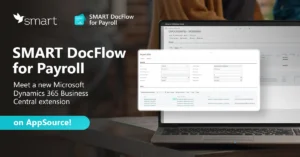Before we look in detail at the functionality and benefits of using ERP systems for small businesses, let’s first debunk a couple of common myths about these solutions.
Myth 1: ERP is only for large companies
There is still a misconception in the business environment that ERP systems (Enterprise Resource Planning systems) are designed for large manufacturing enterprises. In the early 90s, these solutions were actually developed for international industrial corporations. However, they are now successfully used by companies of different sizes and industries. For example, the majority of Microsoft Dynamics 365 Business Central users are small and medium-sized businesses.
Myth 2: ERP is expensive and complicated
Another misconception is that ERP implementation is too expensive and complex for small companies. This is not the case. For example, our company provides a simplified implementation model for Business Central – Self-Service – specifically for small businesses. It involves self-deployment and configuration by the customer of a basic out-of-box solution and allows you to save on customization, maintenance and training, which are more necessary for large organizations.
However, this does not mean that we will leave you alone with the system. To help you, we will prepare a selection of our webinars, articles and video tutorials. These materials are quite sufficient for self-implementation of Business Central, especially since this solution is quite easy to use. If you still have questions, you can always contact us.
By the way, right now you can save even more, because Microsoft provides Ukrainian entrepreneurs with an 80% discount on a Dynamics 365 Business Central license for a year. So, you have a unique opportunity to use an international-class ERP system with great savings.
Benefits of ERP for small businesses
By implementing ERP systems, small companies take a significant step towards more efficient business management and lay a solid foundation for further growth. Let’s talk about some of the main benefits of ERP for small businesses.
More efficient collaboration between departments

After implementing an ERP solution, all employees and departments of the company begin to use a single database, which automatically eliminates many obstacles in their interaction. Product data entered by warehouse workers is momentarily available to the sales department, information about products sold is available to accountants, and accounting data is available to the purchasing department, etc. That is, data does not need to be transferred and approved, which significantly saves employees’ time, simplifies communication and helps avoid misunderstandings.
Eliminating data confusion and errors
For data to be simultaneously available to different departments, it is necessary to unify it. Ordinary Excel spreadsheets, electronic documents – and even more so paper media – do not provide this possibility. The ERP system establishes a single universal business logic for entering data and monitors its compliance. Thereby:
- the data is suitable for use by different departments simultaneously,
- confusion in data is eliminated,
- possibility of incorrect data entry is excluded.
For example, a purchasing department employee simply will not be able to fill out an agreement with a vendor contrary to the configured business logic or enter values into the report table that contradict established rules.
Reduced costs with automation
Another undoubted advantage of an ERP system for small businesses is the ability to automate key processes. Moreover, thanks to the designer with prepared templates, Business Central allows you to do this easily and without special knowledge.
You can write scenarios for various standard processes in the system, as well as set the conditions under which a particular scenario should take place. When a certain event occurs in the system – for example, a contract with a vendor appears – ERP automatically creates a chain of further steps, in our case – a contract approval route. Moreover, this route will depend on various conditions, for example, the amount of the contract.
You can also set up customer interaction policies (for example, to which customers and under what conditions a certain discount can be provided), routes for approving counterparty cards, standard purchase processes, warehouse operations, etc.
Integration with Microsoft Teams and Outlook eliminates the need to monitor the status of processes: when it changes, all involved parties receive notifications about it. Such automation significantly saves employee time and effort, and also minimizes any inconsistency, human errors, downtime and associated costs.
Effective business solutions thanks to analytical tools
The Business Central designer allows you to easily build more than a hundred types of analytical reports that will help you track key processes in all parts of your business: finance, sales, purchasing, etc. But to get the most actionable business insights from this data, you should use Microsoft Power BI, a tool that can replace an entire analytics department. By the way, it belongs to the same ecosystem of products as Business Central, so you don’t have to spend additional time and money to integrate it.

Thanks to a powerful visualization engine, Power BI turns an array of analytical data into comprehensible dashboards that clearly show the correlation of various indicators and their dynamics. In addition, this tool brings together not only data from your ERP, but also other sources – such as CRM or Google Analytics.
This way you can see, for example, how and over what period of time your marketing activities or price adjustments affected sales of certain product categories in different sales channels. Or analyze the CJM (customer journey map) and find out through which channels and in what quantity buyers get into your sales funnel and at what stages and for what reason some of them are lost. Thus, Power BI helps you easily find cause-and-effect relationships, draw conclusions, and make the right business decisions.
Foundation for growth
For small businesses, the implementation of ERP is also important because it allows companies to implement modern western management standards, prepare for upcoming work with foreign counterparties and expand into the markets of other countries. Of course, for this it is better to choose a world-class system that complies with international standards such as IFRS, SOX and GDPR.
As your business grows, starts covering new directions and enters new markets, you can easily scale the ERP system, gradually expanding its functionality. This can be done by reconfiguring its modules, as well as adding all kinds of extensions and tools. Thus, ERP is not only an opportunity to optimize processes and reduce costs today, but also a smart investment in the future.
If you want to learn more about the benefits of ERP systems for small businesses, order a consultation from our experts.


